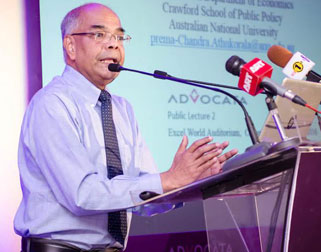Economist urges more investment protection
To drive global production sharing in Lanka
Sri Lanka should cut barriers to trade and investment to attract
foreign investors into electronic component manufacture, top trade
economist Prema-Chandra Athukorala said at a forum organised by Advocata
Institute, a Colombo-based free market think tank.
|

Prof. Prema-Chandra Athukorala |
This would form a natural progression from garment manufacture, on
which the country is now heavily reliant. Sri Lanka's protectionist
trade policy and erosion of confidence in the legal system are key
factors that have discouraged investors resulting a decline in Sri
Lanka's share in world manufacturing exports from around 2000, said
Athukorala, who is a Professor of Economics at the Australian National
University and a top consultant on international trade to a host of
international organisations. The liberalisation undertaken in the late
1970s resulted in a notable increase in manufacturing exports and a
steady increase in Sri Lanka's share in world manufacturing exports.
The reforms suffered a significant setback from about the early 2000:
with the imposition of para-tariffs (taxes over and above normal
tariffs), and a proliferation of ad-hoc duty exemptions and case-by-case
duty adjustments. Sri Lanka has a bewildering number of para-tariffs
including: Ports and Airports Development Levy (PAL), the Customs
Surcharge (SUR), the Commodity Export Subsidy Scheme (Cess), and the
Regional Infrastructure Development Levy (RIDL).
Sri Lanka needs to continue with reforms if it is to reap the
benefits of export led growth. "That is why South Asian countries have
not been able to join global production sharing like East Asia. Just
having cheap labour alone is not enough." The global economic
environment is changing with production sharing (Global Production
Networks- GPN's) becoming the prime mover of cross border production and
trade. GPN's are of two types, buyer driven and producer driven.
To date, most of Sri Lanka's FDI is in Buyer driven GPNs where a
buyer (usually a retailer) buys finished goods. Although common in
industries such as garments and footwear, globally buyer driven GPN's
formed only 12% of world manufacturing trade (in 2012-13), and its share
is declining.
Producer driven GPNs are where an end producer assembles the final
product from components made in several locations. This takes place in
vertically integrated industries such as electronics, medical devices
and cars, Producer driven GPN's accounted for 51.1% of world
manufacturing trade in 2012-3 and its share growing; this is the trend
Sri Lanka needs to tap into according to Prof Athukorala.
Successful integration of the manufacturing sector into producer
driven GPN's has played a key role in employment generation and poverty
reduction in China and other high-performing East Asian countries.
The determinants of a country's success in joining global production
networks are the availability of trainable labour, proactive investment
promotion and service link costs according to the economist.
He emphasized that while the importance of infrastructure and
political stability to reduce link costs are often spoken about, Sri
Lanka needs to focus on property rights protection, ease of enforcing
contracts and a liberal trade and investment policy to attract Foreign
Direct Investment.
The BOI was at one time a one-stop-shop for approvals. Now various
ministries have passed legislation diluting the powers of the BOI
leaving investors with little choice but to approach ministries and line
agencies.
Sri Lanka Tourism has taken over the approval of industry specific
projects and large scale strategic development projects are handled by
the Treasury and cabinet review committee. Moreover, there is a high
degree of variability in incentives offered across various
products/sectors and among firms with ample room for the discretion of
BOI officials over actual viability and national economic gains. This
creates unnecessary hassle and uncertainty for investors.
As the country is integrating into a global production network it is
necessary to import as well export therefore trade liberalisation; the
free import of intermediate products and components; must go hand in
hand with investment liberalisation.
Prof. Athukorala is an Advisor to the Advocata Institute. The talk
was part of a series of lectures on improving Sri Lanka's economy hosted
by Advocata. |

